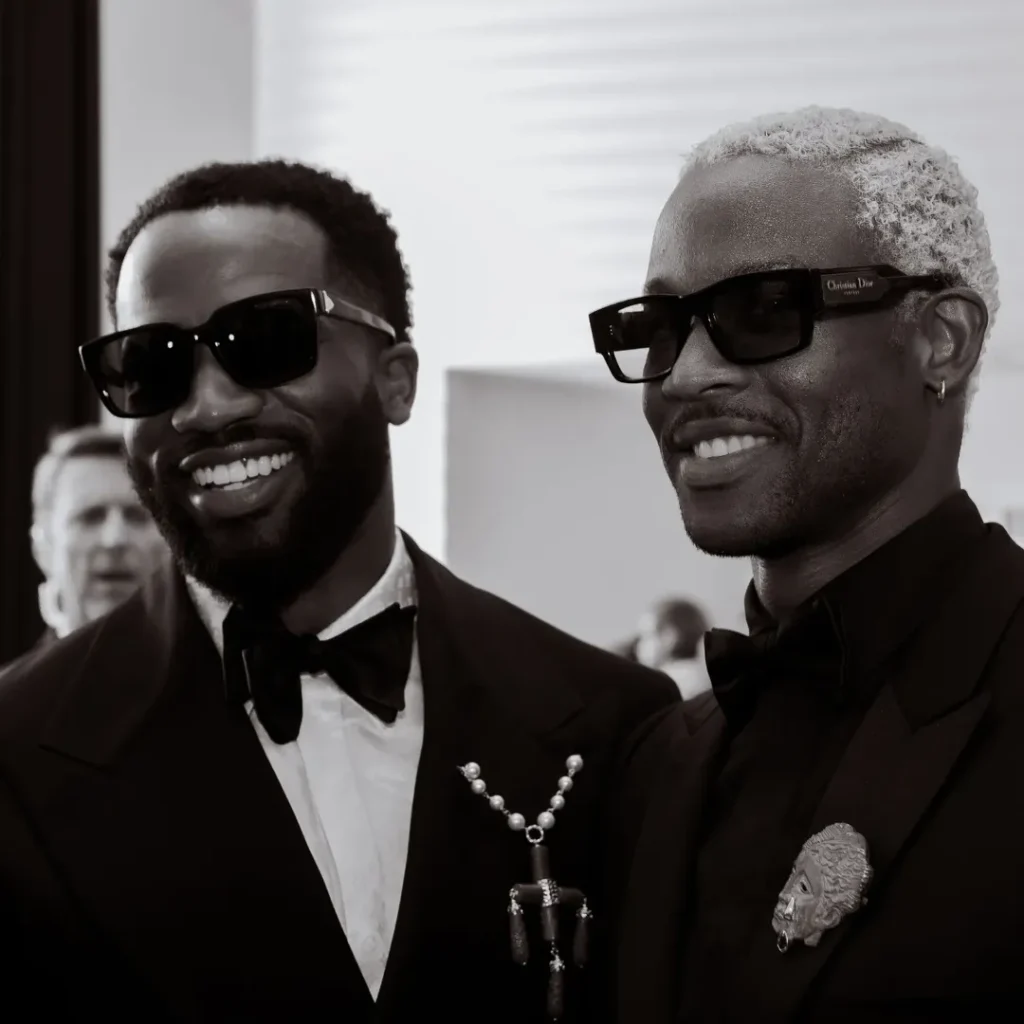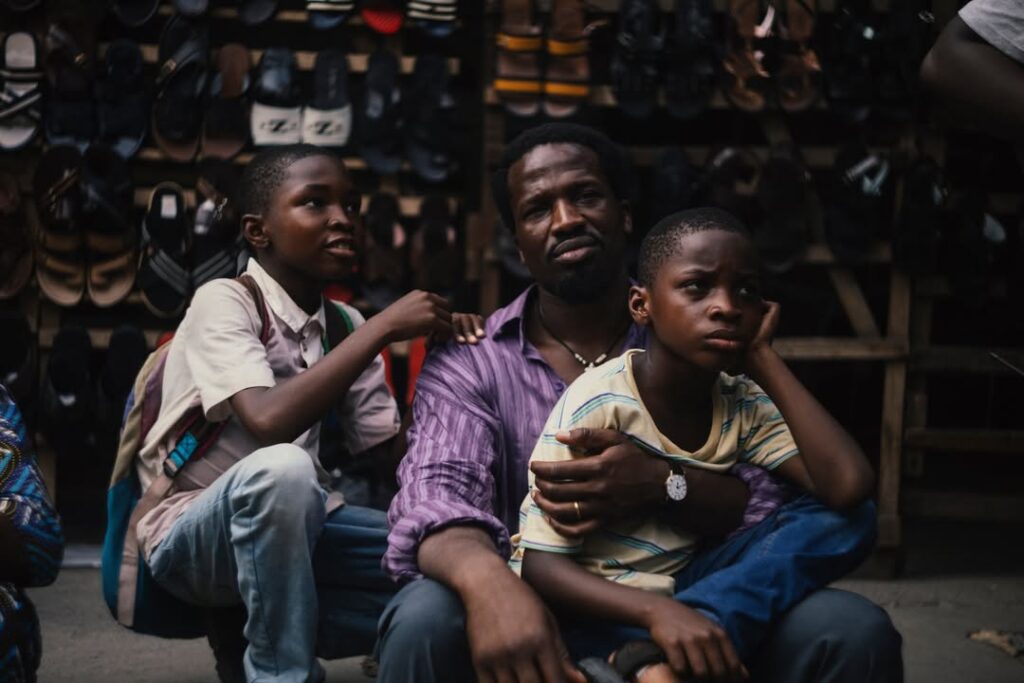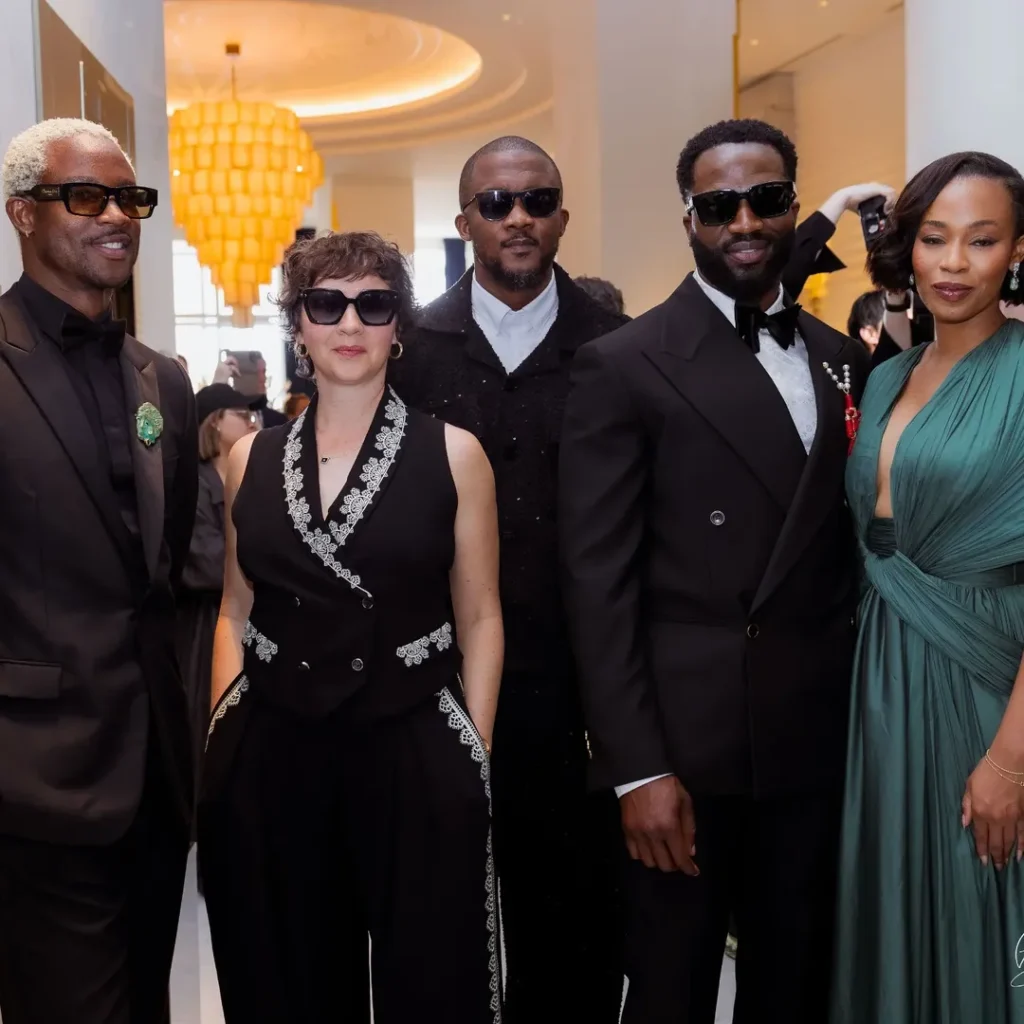
There are moments when history happens quietly. Not with fireworks, but with the hush of anticipation and the swell of a violin score in a darkened theater. When My Father’s Shadow premiered in the Un Certain Regard section at the 77th Cannes Film Festival, we at Guzangs were not just spectators—we were part of the story.
Months earlier, our editorial team ran a spotlight on the film when it was first announced, celebrating it as the first Nigerian fiction film selected for Cannes’ official lineup. At the time, it felt monumental. But nothing—absolutely nothing—could have prepared us for what it felt like to actually sit in that theater, watch the screen come alive, and witness what would become a turning point in Nigerian cinematic history.
“A Day in Lagos” That Spanned a Generation

Akinola Davies Jr.’s debut feature unfolds over the course of one day in 1993 Lagos—a father reunited with his two sons, set against the backdrop of the impending Nigerian presidential election. What we get is not just a coming-of-age story, but a delicate meditation on fatherhood, memory, national trauma, and identity.
As I watched, I cried. And I wasn’t alone. The film doesn’t tug at your emotions—it invites them, sitting with you like an old friend whispering stories of home.
The child actors—Godwin Chiemerie Egbo and Chibuike Marvellous Egbo—deliver performances that are so disarmingly natural you forget you’re watching fiction. These boys are stars in the making. Their eyes carry the kind of weight only lived experience can bring. Their chemistry, effortless. Their future? Bright.
Crafted with Care: The Visuals and Sound That Made It Real

Let’s talk about the production design. There’s an intimacy to the Lagos Akinola gives us—messy, tender, complicated. Not a postcard-perfect Lagos, but a lived-in, breathing city. We felt the heat rising off the pavements. We saw the dust gathering on windowsills.
The unsung heroes of this achievement? The set designers and art department, most of whom are operating behind the scenes. It’s their work that took us back to 1993 with astonishing precision. Their attention to detail deserves its own ovation. Speaking with the team from Anti Design.
“Your first feature always marks you, but this one left something deep. It taught us how to stretch beyond what we thought we could do, how to trust our voice, and how to hold a vision steady even when everything around you shifts. Cannes was a beautiful ending to a long, meaningful chapter”, Jennifer added.
“This wasn’t just a job. It felt like a collective act of belief. In each other, in the story, in the vision. We built from scratch, leaned on our team, and held each other up through it all. That it made it to Cannes is a testament to what happens when people care deeply. We’re so proud to have been part of it.” – Pablo Anti
And then there’s the sound. The score by Duval Timothy and CJ Mirra swells and dissolves in just the right moments. It doesn’t compete—it completes. The music becomes a character, echoing the heartbeat of the story. The way it lingers long after the credits roll? Magic.
Guzangs on the Ground at Cannes
Being in Cannes for the screening was surreal. My Father’s Shadow wasn’t just a film on a program—it was the moment. As editors, curators, and cultural commentators, we’re used to scanning for potential. This wasn’t potential. This was presence.
At Guzangs, we don’t just report the culture—we feel it, we live it. Sitting among the global press and hearing whispered awe in French, in Italian, in hushed English phrases like “breathtaking,” “intimate,” “important”—this was our story, and the world was finally listening.
So when the film received a Special Mention for the Caméra d’Or, we felt seen. It was a nod to every Nigerian creative who has ever been told their stories are “too specific,” their style “too local,” their voices “not universal enough.”
Akinola Davies Jr. didn’t just make a film. He cracked open the canon.
A Film Powered by Collaboration and Community

This is where we celebrate the team behind the lens. My Father’s Shadow is a collaborative feat—from Element Pictures and BBC Film to Nigeria’s own Fatherland Productions. But it’s also deeply local. Over 80% of the crew was African, most of them Nigerian.
Co-producer Funmbi Ogunbanwo told the press:
“We really believe in growing the industry and the talent. If you don’t let them do it, how will they learn?”
We echo that sentiment. Growth doesn’t come from permission—it comes from participation. And these filmmakers, designers, and creatives didn’t just participate—they defined the moment.
While set designers don’t often take center stage in media coverage, their role in this film cannot be overstated. If Guzangs can do anything with this platform, it’s to make sure that the spotlight widens. Those whose brushstrokes and fabric choices shaped this world are named, known, and celebrated.
We’re currently reaching out to the film’s art department and production designers for deeper commentary—so stay tuned for an exclusive Guzangs interview that gives these visionaries the flowers they deserve.
The Future is Already Here
What happens after Cannes? For many African films, accolades are often followed by silence. Not this time. Mubi has already picked up the film for release in North America, the UK, Ireland, and Turkey. This isn’t just about distribution—it’s about visibility.
And with Nigeria’s creative industry gaining momentum across fashion, music, and now cinema, My Father’s Shadowdoesn’t just reflect where we are—it forecasts where we’re going.
At Guzangs, we’ve always believed in the intersection of culture and courage. This film embodies both.
We walked into Cannes proud. We left transformed. My Father’s Shadow reminded us why we do what we do at Guzangs—why we care about storytelling, heritage, representation, and the power of design.
This was a love letter to Nigeria. One penned not just by a director, but by a crew of artisans, a pair of young actors, and a nation ready to be seen.
So here’s to Akinola, to the boys, to the set designers, to every creative who makes the magic behind the curtain.
We see you. And so does the world.